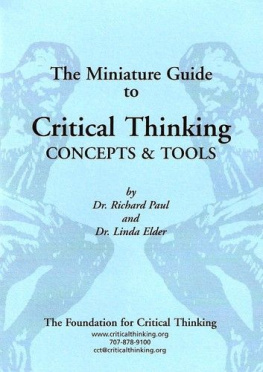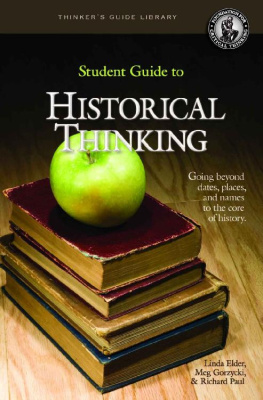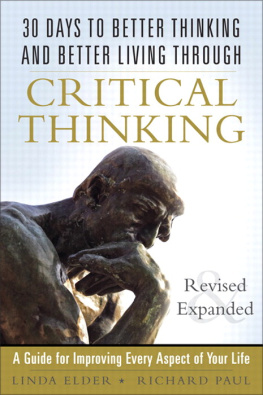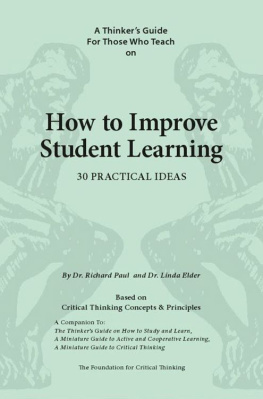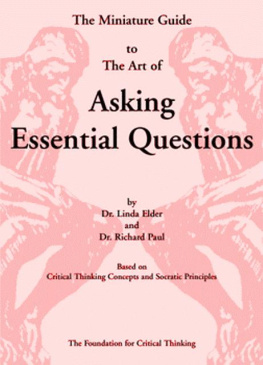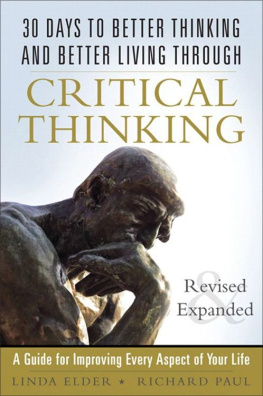The Miniature Guide
to
Critical Thinking
Concepts and Tools
By Dr. Richard Paul
and
Dr. Linda Elder
The Foundation for Critical Thinking
www.criticalthinking.org
707-878-9100
cct@criticalthinking.org
Why A Critical Thinking Mini-Guide?
This miniature guide focuses on the essence of critical thinking concepts and tools distilled into pocket size. For faculty it provides a shared concept of critical thinking. For students it is a critical thinking supplement to any textbook for any course. Faculty can use it to design instruction, assignments, and tests in any subject. Students can use it to improve their learning in any content area. Its generic skills apply to all subjects. For example, critical thinkers are clear as to the purpose at hand and the question at issue. They question information, conclusions, and points of view. They strive to be clear, accurate, precise, and relevant. They seek to think beneath the surface, to be logical, and fair. They apply these skills to their reading and writing as well as to their speaking and listening. They apply them in history, science, math, philosophy, and the arts; in professional and personal life.
When this guide is used as a supplement to the textbook in multiple courses, students begin to perceive the usefulness of critical thinking in every domain of learning. And if their instructors provide examples of the application of the subject to daily life, students begin to see that education is a tool for improving the quality of their lives.
If you are a student using this mini-guide, get in the habit of carrying it with you to every class. Consult it frequently in analyzing and synthesizing what you are learning. Aim for deep internalization of the principles you find in ituntil using them becomes second nature.
If successful, this guide will serve faculty, students, and the educational program simultaneously.

Linda Elder
Foundation for Critical Thinking

Richard Paul
Center for Critical Thinking
Copyright 1999, 2001, 2002, 2006, 2008, 2009 by Foundation for Critical Thinking All rights reserved.
Library of Congress Cataloging-in-Publication Data
Paul, Richard
Th e miniature guide to critical thinking concepts and tools / Richard Paul, Linda Elder 6th ed
ISBN 978-0944583-10-4
1. Critical thinking. 2. Critical thinking instruction. I. Elder, Linda. II. Title
Contents
Why Critical Thinking?
The Problem:
Everyone thinks; it is our nature to do so. But much of our thinking, left to itself, is biased, distorted, partial, uninformed or down-right prejudiced. Yet the quality of our life and that of what we produce, make, or build depends precisely on the quality of our thought. Shoddy thinking is costly, both in money and in quality of life. Excellence in thought, however, must be systematically cultivated.
A Definition:
Critical thinking is the art of analyzing and evaluating thinking with a view to improving it.
The Result:
A well cultivated critical thinker:
- raises vital questions and problems, formulating them clearly and precisely;
- gathers and assesses relevant information, using abstract ideas to interpret it effectively;
- comes to well-reasoned conclusions and solutions, testing them against relevant criteria and standards;
- thinks openmindedly within alternative systems of thought, recognizing and assessing, as need be, their assumptions, implications, and practical consequences; and
- communicates effectively with others in figuring out solutions to complex problems.
Critical thinking is, in short, self-directed, self-disciplined, self-monitored, and self-corrective thinking. It requires rigorous standards of excellence and mindful command of their use. It entails effective communication and problem solving abilities and a commitment to overcoming our native egocentrism and sociocentrism.
The Elements of Thought
A Checklist for Reasoning
1) All reasoning has a PURPOSE.
- Can you state your purpose clearly?
- What is the objective of your reasoning?
- Does your reasoning focus throughout on your goal?
- Is your goal realistic?
2) All reasoning is an attempt to figure something out, to settle some QUESTION, to solve some PROBLEM.
- What question are you trying to answer?
- Are there other ways to think about the question?
- Can you divide the question into sub-questions?
- Is this a question that has one right answer or can there be more than one reasonable answer?
- Does this question require judgment rather than facts alone?
3) All reasoning is based on ASSUMPTIONS.
- What assumptions are you making? Are they justified?
- How are your assumptions shaping your point of view?
- Which of your assumptions might reasonably be questioned?
4) All reasoning is done from some POINT OF VIEW.
- What is your point of view? What insights is it based on? What are its weaknesses?
- What other points of view should be considered in reasoning through this problem? What are the strengths and weaknesses of these viewpoints? Are you fairmindedly considering the insights behind these viewpoints?
5) All reasoning is based on DATA, INFORMATION, and EVIDENCE.
- To what extent is your reasoning supported by relevant data?
- Do the data suggest explanations that differ from those you have given?
- How clear, accurate, and relevant are the data to the question at issue?
- Have you gathered data sufficient to reaching a reasonable conclusion?
6) All reasoning is expressed through, and shaped by, CONCEPTS and THEORIES.
- What key concepts and theories are guiding your reasoning?
- What alternative explanations might be possible, given these concepts
and theories? - Are you clear and precise in using concepts and theories in your reasoning?
- Are you distorting ideas to fit your agenda?
7) All reasoning contains INFERENCES or INTERPRETATIONS by which we draw CONCLUSIONS and give meaning to data.
- To what extent do the data support your conclusions?
- Are your inferences consistent with each other?
- Are there other reasonable inferences that should be considered?
8) All reasoning leads somewhere or has IMPLICATIONS and CONSEQUENCES.
- What implications and consequences follow from your reasoning?
- If we accept your line of reasoning, what implications or consequences are likely?
Questions Using the Elements of Thought

